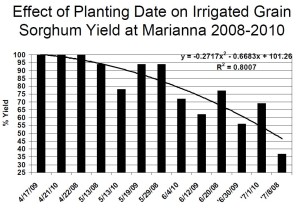Too much of a good thing can sometimes be a bad thing and in West Tennessee this year that “thing” is rain. We have been getting a lot of calls from producers this week asking “Is it too late to plant sorghum?” and “Will I still get good yields with planting this late?” In many cases these calls are related to flooded corn and cotton fields that will need to be planted late to an alternative crop. There are a few things to consider when planting sorghum this late.
First, you have to think about what herbicides have been put out with the previous failed crop and how they will affect your sorghum. Second, can you get it out soon enough for crop insurance? June 10th is the last day for full insurance coverage for our producers, so if you decide to go with grain sorghum it needs to be planted soon. Finally, which hybrid will give the best yield potential? Dr. Jason Kelly at the University of Arkansas evaluated 4 full season hybrids (Pioneer 84G62, Triumph 82-G, Terral 96H81, and Dekalb 54-00 or 53-67) at different plant dates under irrigated conditions and got variable results.
As you can see from the graph, the longer planting is delayed the more chance you will see a reduction in yield. There is still enough time left to plant full season hybrids, so don’t sell your fields short. However, you might consider backing off some on the populations since this crop will experience warmer temperatures and emerge more quickly than earlier planted sorghum.
Probably the most important issue to address is the increased cost. You will definitely see more insect pressure on late planted sorghum and should expect to make at least one and maybe two extra insecticide applications. The big pest to watch is the sugarcane aphid. Dr. Scott Stewart posted some control recommendations in an earlier post that may prove very valuable in the near future (https://news.utcrops.com/2015/05/steps-for-managing-insects-in-grain-sorghum/). Another cost to add in is a harvest aid. A late planted sorghum crop will need help shutting down and an application of glyphosate or sodium chlorate will be needed about 7-10 days before harvest.
To recap, when planting grain sorghum after May you want to think about previous herbicides applied to that field and whether or not they will impact your new crop, is it still early enough to get insurance, plant a full season hybrid (under irrigation if possible) for higher yield potential, and finally be prepared to spend more time scouting and managing insects (especially sugarcane aphid).


